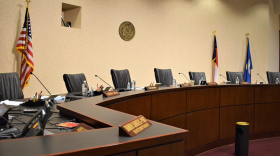The UNC System Board of Governors has eliminated its policy requiring diversity, equity and inclusion offices at all public universities in the state. The vote passed with several other policies on the board’s consent agenda.
The vote also approved a new policy that requires individual university chancellors to reduce “force and spending” for DEI initiatives on their campuses and report how they’ve done so to UNC System President Peter Hans by September.
Board member Gene Davis said the new policy will charge chancellors to review programs, keeping those that make all students, faculty, and other campus members feel included.
“... and with an eye to altering any program that has been less than welcoming.” Davis said.
Hans dedicated his presidential remarks to defending the vote.
“Our public universities must take a stance of principled neutrality on matters of political controversy,” Hans said. “Faculty and students are free to weigh in on all manner of current events and high-profile issues, while university staff must exercise restraint.”
“It is not the job of the university to decide all the complex and multi-dimensional questions of how to balance and interpret identity,” Hans continued. “... this policy will preserve the university’s role as a trusted venue for that vital debate, and for all others. I believe it’s what our democratic responsibility demands of us, and I am fully committed to help us realize its aspirations.”
Board member Pearl Burris-Floyd said campus leaders should not feel that the board "has turned their backs on them."
"We are allowing our educators to educate, to lead with confidence. Even if it's not called DEI, we have a way to help people and make that path clearer for all people,” Burris-Floyd said.

Two board members, Sonja Phillips Nichols and Joel Ford, voted against removing the policy.
“I've seen the things that's going on the campuses with protests — we had one this morning,” Nichols said. “I just want to make sure every voice was heard. And there's sometimes I feel like it's not. And so that was my reasoning for voting the way that I did.”
About an hour before the meeting, students from several UNC System schools held a rally against the impending policy vote.

Students from North Carolina State University, UNC Asheville, UNC-Chapel Hill, UNC Pembroke and the North Carolina School for Science and Mathematics shared what DEI programming meant to them and said their schools wouldn’t be the same without it.
“We are here to send a message today that we are the real stakeholders of the UNC system,” said Nathaniel Dibble, a student and member of the NC State Chapter of the Young Democratic Socialists of America.
“The Board of Governors’ proposed policies will be disastrous for diversity and equity on our college campuses,” Dibble said. “Those seeking education will be locked out of the institutions that can give it to them. Those of us that are currently in these institutions will have crucial resources taken away from us.”
Two protesters were arrested during the meeting, according to a UNC System spokesperson.
Alexander Denza, a UNC-Chapel Hill student and member of the Southern Student Action Coalition, said the arrests occurred on the 9th floor of the building. The UNC BOG meeting was on the 17th floor and required a keycard to use the elevator.

These aren’t the only groups that are upset with the UNC BOG’s decision. Dozens of students, alumni, faculty and staff, as well as parents of current students sent messages to the UNC Board of Governors overwhelmingly defending DEI.
The letters flagged potential consequences of a ban, including that it could hurt enrollment, complicate efforts to implement federal research grants that require a DEI component, and make the UNC system less globally competitive.
"This is simply an application of a minority ideology on a large economic engine of our state, depressing the hopes of a majority upon the whims of the minority," said Manbir Guron, a N.C. State student.
Nikki Moore, a visiting assistant professor of art and architectural history at Wake Forest, called diversity a "fact of life" and noted that inclusion builds more knowledgeable and resilient students.
“We've already seen the world of the 1950s, where only a small circle of white privileged men made decisions for all. We left that model far behind because it wasn't working for the majority of the nation. Why visit that same mistake again in 2024?” she wrote.
Some people sent letters in support of the policy change. One was from the James Martin Center, a think tank with ties to BOG member and influential GOP donor Art Pope.
“By prioritizing true equality rather than the politicized alternative 'equity,'” Jenna Robinson, the center's president, said. “The University of North Carolina can ensure that every student, faculty member, and staff member is afforded the same rights, opportunities, and resources necessary to thrive academically and professionally.”
It is unclear if the BOG's decision will lead to DEI staff being fired. However, at UNC-Chapel Hill, board of trustees members are already calling for the removal and transfer of DEI funds to public safety.
Meanwhile, Hans said the UNC-Chapel Hill Board of Trustees’ vote to redirect $2.3 million of DEI funding to public safety was against UNC Board of Governors policy.
“Our legal counsel advised theirs that they don’t have the ability to change line items within the university’s budget,” Hans said. “They chose to disregard that advice and thus what was considered yesterday by the Board of Governors was interim Chancellor Roberts’ budget recommendation.”

The UNC System said the goal of the policy is not to cut jobs, but that “every campus has a different structure when it comes to support services, and they’ll need to make any necessary adjustments to comply with this new policy.” The System said any “savings” from these adjustments will be redirected to student success initiatives.
The UNC System also said the DEI policy removal does not require the elimination of identity-based centers.
“Campuses will continue to implement programming and services to assist students of different backgrounds to improve academic performance,” the UNC System said in a statement. “As long as programs comply with legal requirements for institutional neutrality and nondiscrimination.”
However, one UNC-Chapel Hill trustee, Marty Kotis, has already called for "activist centers" to be defunded at the university. UNC-Chapel Hill, like many other universities in the UNC System, has several identity-based centers for cultural, LGBTQ, women and other communities.
Another trustee, Jim Blaine, previously predicted the UNC BOG would “follow Florida’s path” in eliminating DEI initiatives. Anti-DEI bills in Florida led the University of Florida to fire 13 staff members and eliminate its chief diversity officer position.
According to the Chronicle of Higher Education over 80 anti-DEI bills have been proposed nationwide since 2023. Ten states, including Alabama, Texas and North Carolina have signed some form of anti-DEI legislation into law.
Correction: This story has been updated to mention that two protesters were arrested during the meeting. An earlier version of the story misstated where the protesters were located.







